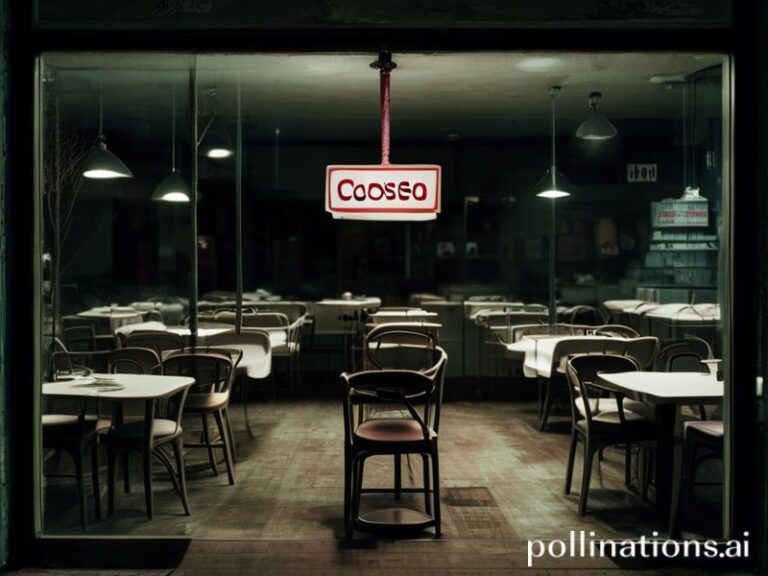Christian Yelich: The $215 Million Ballplayer Teaching the World to Stop Worrying and Love Mediocrity
Christian Yelich and the Global Currency of Elite Mediocrity
Dave’s Locker – International Sports Desk
MILWAUKEE, USA – While half the planet argues over the price of bread and the other half doom-scrolls through the latest geopolitical fire sale, Christian Yelich woke up this morning, stretched his $215-million hamstrings, and prepared to jog languidly toward another 2-for-4 afternoon. Somewhere a Sri Lankan tea picker muttered a prayer that the power would stay on long enough to freeze the day’s harvest; Yelich muttered a prayer that the roof at American Family Field would close before his hair gel liquefied. Both petitions carry roughly the same statistical probability of being answered, yet only one of them will be televised in 167 countries.
Welcome to the modern economy of elite athletic stardom, where a left-handed swing once compared to Ted Williams now functions mainly as a hedge fund in cleats. Yelich’s contract—signed in 2020, moments before the world discovered that toilet paper was the true reserve currency—is guaranteed through 2028 with a mutual option for 2029. If that sounds like the kind of fiscal fantasy usually reserved for arms dealers or cryptocurrency evangelists, congratulations: you’ve grasped the international significance of a .255 hitter with a no-trade clause.
Globally, Yelich is less a ballplayer than a floating exchange rate. Every time he barrels a slider, regional sports networks from Taipei to Turin cut to their local baseball academies, where teenagers dream of one day underperforming for only $25 million a year. MLB International beams Brewers highlights into hotel rooms from Lagos to Laos, mostly to remind traveling American executives that something back home still works, albeit on a 162-game installment plan. The irony, of course, is that Yelich’s OPS+ has hovered around league average since 2020, making him the perfect avatar for late-capitalist resilience: the worse the fundamentals, the more reassuring the brand.
Across the Atlantic, European football fans—accustomed to weekly relegation terror—watch Yelich’s guaranteed money the way medieval peasants once gazed at stained glass: equal parts awe and quiet resentment. In Seoul, sabermetric monks chart his exit velocity against KBO salary caps and sigh at the cosmic injustice. Meanwhile, Milwaukee’s front office, staffed by MBAs who speak fluent WAR, keeps the international rights revenue flowing by reminding global partners that even regression to the mean is still regression on a 4K super-slow-mo camera.
There is, naturally, a darker subplot. In Venezuela, where the average monthly wage now equals roughly three innings of a Yelich at-bat, kids skip stones across the Caribbean and wonder if defecting for a minor-league bus ride beats staying home for the rolling blackouts. In Cuba, state television still airs the 2018 MVP season on loop, a nightly reminder that the revolution’s greatest export might be melancholy. Yelich himself has never met these viewers, but his Statcast page speaks fluent soft power: every 110-mph line drive is a whispered promise that somewhere, somehow, the dream is still solvent.
Back in Wisconsin, the local chamber of commerce reports that Japanese tour groups now schedule July pilgrimages to Miller Park (excuse me, “American Family Field”) to watch a man hit singles off the wall and sign $400 jerseys. The pilgrims leave clutching bobbleheads like relics, secure in the knowledge that the global supply chain of hope runs through a parking lot dotted with bratwurst stands. One Tokyo travel agent confessed that the appeal lies precisely in Yelich’s ordinariness: “He proves you can be mediocre and still monumentally rich. For our clients, that’s the purest American magic left.”
And so the planet spins, carbon accumulates, and Christian Yelich digs in against another 95-mph metaphor for late-stage imperial decline. He pops out to shallow left. The crowd groans; the stock market yawns; a super-cut is instantly uploaded to TikTok with the caption “Me trying to fix my life.” Somewhere a Ukrainian utility worker toggles a generator and catches the highlight on a cracked phone screen. He laughs—because if the world insists on broadcasting slow-motion collapse, you might as well root for the guy who gets paid either way.
Final score: Brewers 3, Existential Dread 2. The contract, like the climate, is fully guaranteed.







